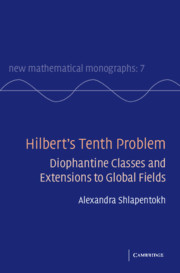Book contents
- Frontmatter
- Contents
- Acknowledgements
- 1 Introduction
- 2 Diophantine classes: definitions and basic facts
- 3 Diophantine equivalence and Diophantine decidability
- 4 Integrality at finitely many primes and divisibility of order at infinitely many primes
- 5 Bound equations for number fields and their consequences
- 6 Units of rings of W-integers of norm 1
- 7 Diophantine classes over number fields
- 8 Diophantine undecidability of function fields
- 9 Bounds for function fields
- 10 Diophantine classes over function fields
- 11 Mazur's conjectures and their consequences
- 12 Results of Poonen
- 13 Beyond global fields
- Appendix A Recursion (computability) theory
- Appendix B Number theory
- References
- Index
6 - Units of rings of W-integers of norm 1
Published online by Cambridge University Press: 14 October 2009
- Frontmatter
- Contents
- Acknowledgements
- 1 Introduction
- 2 Diophantine classes: definitions and basic facts
- 3 Diophantine equivalence and Diophantine decidability
- 4 Integrality at finitely many primes and divisibility of order at infinitely many primes
- 5 Bound equations for number fields and their consequences
- 6 Units of rings of W-integers of norm 1
- 7 Diophantine classes over number fields
- 8 Diophantine undecidability of function fields
- 9 Bounds for function fields
- 10 Diophantine classes over function fields
- 11 Mazur's conjectures and their consequences
- 12 Results of Poonen
- 13 Beyond global fields
- Appendix A Recursion (computability) theory
- Appendix B Number theory
- References
- Index
Summary
W-units play an important role in the construction of Diophantine definitions over number fields. In this chapter we discuss some properties of these units.
What are the units of the rings of W-integers?
Definition 6.1.1. Let K be a number field. Let W be a collection of its nonarchimedean primes. Let x ∈ K be such that its divisor is a product of powers of elements of W. Then x is called a W-unit. If W is empty then a W-unit is just an integral unit of K, i.e. an algebraic integer whose multiplicative inverse is also an algebraic integer.
Next we list some useful properties of these units. The first one is a generalization of the well-known Dirichlet unit theorem.
Proposition 6.1.2.Let K and W be as above. Then W-units form a multiplicative group. If the number of primes in W is finite, then the rank of this group is equal to the rank of the integral unit group plus the number of elements in W. (See the generalized version of the Dirichlet unit theorem in [64].)
The next lemma is a direct consequence of the definition of the rings of W-integers. (See Definition B.1.20.)
Lemma 6.1.3.Let K and W be again as above. Then the only invertible elements of OK, W (or the only units of OK, W) are the W-units.
The next lemma is important in making sure that the divisibility conditions discussed in Chapter 5 can be satisfied.
- Type
- Chapter
- Information
- Hilbert's Tenth ProblemDiophantine Classes and Extensions to Global Fields, pp. 75 - 95Publisher: Cambridge University PressPrint publication year: 2006



